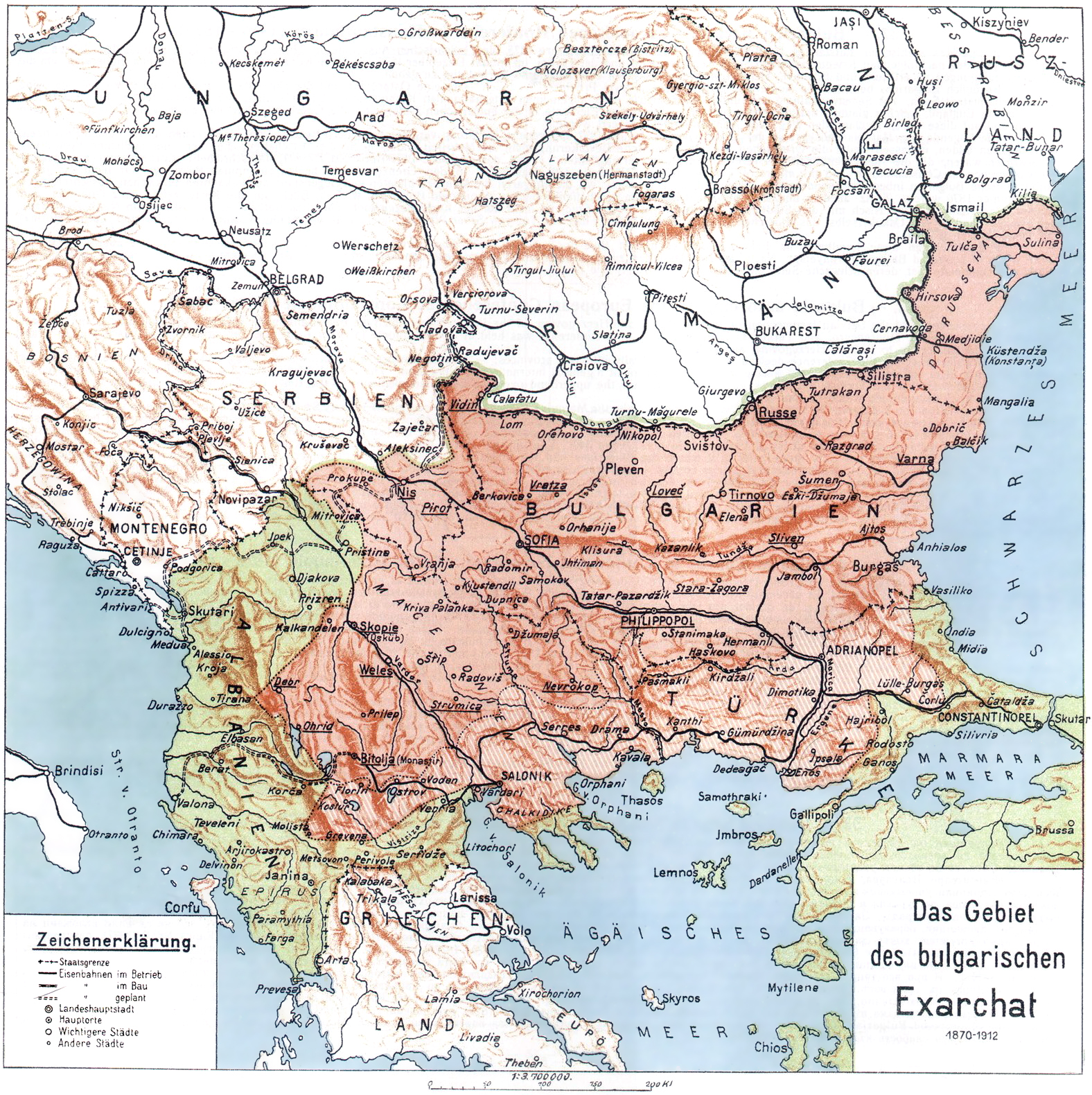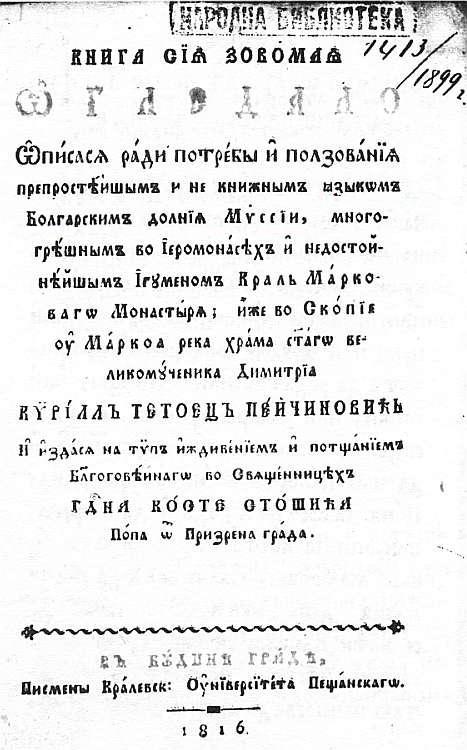|
Spiro Kitinchev
Spiro Kitinchev (born 1895 in Skopje, Ottoman Empire, died 1946 in Idrizovo, FPR Yugoslavia) was a Macedonian Bulgarian writer, activist, and politician during the Second World War in Yugoslav Macedonia. Biography During his teenage years Spiro attended the Bulgarian Men's High School of Thessaloniki, then part of the Ottoman Empire. In 1912 Skopje was ceded to Serbia where the Macedonian Slavs were faced with the policy of forced serbianisation. When during World War I Bulgaria occupied Macedonia (1915 - 1918) his father, Georgi Kitinchev became a mayor of Skopje. At the same time he studied in Lausanne, Switzerland. Spiro was involved there in the organization of Macedonian students called MYSRO. In 1919, during the meetings of the Paris Peace Conference, the MYSRO issued appeale in favor of an independent multiethnic Macedonian state, based on the principle of the Swiss Confederation. After 1919, Kitinchev returned to Skopje, then part of Kingdom of Yugoslavia. He was ... [...More Info...] [...Related Items...] OR: [Wikipedia] [Google] [Baidu] |
Skopje
Skopje ( , , ; mk, Скопје ; sq, Shkup) is the capital and largest city of North Macedonia. It is the country's political, cultural, economic, and academic centre. The territory of Skopje has been inhabited since at least 4000 BC; remains of Neolithic settlements have been found within the old Kale Fortress that overlooks the modern city centre. Originally a Paeonian city, Scupi became the capital of Dardania in the second century BC. On the eve of the 1st century AD, the settlement was seized by the Romans and became a military camp. When the Roman Empire was divided into eastern and western halves in 395 AD, Scupi came under Byzantine rule from Constantinople. During much of the early medieval period, the town was contested between the Byzantines and the Bulgarian Empire, whose capital it was between 972 and 992. From 1282, the town was part of the Serbian Empire, and acted as its capital city from 1346 to 1371. In 1392, Skopje was conquered by the Ottoman Turks ... [...More Info...] [...Related Items...] OR: [Wikipedia] [Google] [Baidu] |
MANAPO
The Macedonian National Movement (abbreviated MANAPO) ( mk, Македонски Национален Покрет, transliterated: ''Makedonski Nacionalen Pokret'') was a leftist movement started in 1936 among the progressive Macedonian students in the Belgrade, Zagreb and some other universities in interwar period. Numerous members of the groups subsequently joined Yugoslav Partisans with promient one being the future first president of independent Macedonia Kiro Gligorov. In 26 August 1936 at the University of Zagreb a group of Macedonian students belonging to the group signed the ''Political Declaration'', an illegal document requesting political and social emancipation of Macedonians in the Kingdom of Yugoslavia. MANAPO's aims were to help restore functional parliamentary democracy in the post-6 January Dictatorship Kingdom of Yugoslavia and to advocate for the right to self-determination of the Bulgarians in Vardar Macedonia. The mainstream historiography in the post war SFR ... [...More Info...] [...Related Items...] OR: [Wikipedia] [Google] [Baidu] |
Bulgarian Politicians
Bulgarian may refer to: * Something of, from, or related to the country of Bulgaria * Bulgarians, a South Slavic ethnic group * Bulgarian language, a Slavic language * Bulgarian alphabet * A citizen of Bulgaria, see Demographics of Bulgaria * Bulgarian culture * Bulgarian cuisine, a representative of the cuisine of Southeastern Europe See also * * List of Bulgarians, include * Bulgarian name, names of Bulgarians * Bulgarian umbrella, an umbrella with a hidden pneumatic mechanism * Bulgar (other) * Bulgarian-Serbian War (other) The term Bulgarian-Serbian War or Serbian-Bulgarian War may refer to: * Bulgarian-Serbian War (839-842) * Bulgarian-Serbian War (853) * Bulgarian-Serbian wars (917-924) * Bulgarian-Serbian War (1330) * Bulgarian-Serbian War (1885) * Bulgarian-Serbi ... {{disambiguation Language and nationality disambiguation pages ... [...More Info...] [...Related Items...] OR: [Wikipedia] [Google] [Baidu] |
1944 Bulgarian Coup D'état
The 1944 Bulgarian coup d'état, also known as the 9 September coup d'état ( bg, Деветосептемврийски преврат, Devetoseptemvriyski prevrat), was the forcible change of the government of Kingdom of Bulgaria carried out on the eve of 9 September 1944. In the People's Republic of Bulgaria it was called People's Uprising of 9 September – on the grounds of the broad unrest, and Socialist Revolution – as it was a turning point politically and the beginning of radical reforms towards socialism. In brief Bulgaria was in a precarious situation, still in the sphere of Nazi Germany's influence (as a former member of the Axis powers, with German troops in the country despite the declared Bulgarian neutrality 15 days earlier), but under threat of war with the leading military power of that time, the Soviet Union (the USSR had declared war on the Kingdom of Bulgaria 4 days earlier and units of its Third Ukrainian Front of the Red Army had entered Bulgaria 3 da ... [...More Info...] [...Related Items...] OR: [Wikipedia] [Google] [Baidu] |
Anti-fascist Assembly For The National Liberation Of Macedonia
The Anti-fascist Assembly for the National Liberation of Macedonia ( mk, Антифашистичко собрание за народно ослободување на Македонија (АСНОМ), ''Antifašističko sobranie za narodno osloboduvanje na Makedonija''; Serbo-Croatian: ''Antifašističko sobranje narodnog oslobođenja Makedonije''; abbr. ASNOM) was the supreme legislative and executive people's representative body of the Socialist Republic of Macedonia, communist Macedonian state from August 1944 until the end of World War II. The body was set up by the Macedonian Partisans during the final stages of the World War II in Yugoslav Macedonia. That occurred clandestinely in August 1944, in the Bulgaria during World War II, Bulgarian occupation zone of Yugoslavia. Simultaneously Independent Macedonia (1944), another state was declared by pro-Nazi Germany Macedonian right-wing nationalists. History First session (under occupation) Significance The first plenary se ... [...More Info...] [...Related Items...] OR: [Wikipedia] [Google] [Baidu] |
Yugoslav Communists
Yugoslav or Yugoslavian may refer to: * Yugoslavia, or any of the three historic states carrying that name: ** Kingdom of Yugoslavia, a European monarchy which existed 1918–1945 (officially called "Kingdom of Serbs, Croats and Slovenes" 1918–1929) ** Socialist Federal Republic of Yugoslavia or SFR Yugoslavia, a federal republic which succeeded the monarchy and existed 1945–1992 ** Federal Republic of Yugoslavia, or FR Yugoslavia, a new federal state formed by two successor republics of SFR Yugoslavia established in 1992 and renamed "Serbia and Montenegro" in 2003 before its dissolution in 2006 * Yugoslav government-in-exile, an official government of Yugoslavia, headed by King Peter II * Yugoslav Counter-Intelligence Service * Yugoslav Inter-Republic League * Yugoslav Social-Democratic Party, a political party in Slovenia and Istria during the Austro-Hungarian Empire and the Kingdom of Yugoslavia * Serbo-Croatian language, proposed in 1861 and rejected as the legal name of th ... [...More Info...] [...Related Items...] OR: [Wikipedia] [Google] [Baidu] |
Macedonism
Macedonian nationalism (, ) is a general grouping of nationalist ideas and concepts among ethnic Macedonians that were first formed in the late 19th century among separatists seeking the autonomy of the region of Macedonia from the Ottoman Empire. The idea evolved during the early 20th century alongside the first expressions of ethnic nationalism among the Slavs of Macedonia. The separate Macedonian nation gained recognition after World War II when the " Socialist Republic of Macedonia" was created as part of Yugoslavia. Afterwards the Macedonian historiography has established historical links between the ethnic Macedonians and events and Bulgarian figures from the Middle Ages up to the 20th century. Following the independence of the Republic of Macedonia in the late 20th century, issues of Macedonian national identity have become contested by the country's neighbours, as some adherents to aggressive Macedonian nationalism, called ''Macedonism'', hold more extreme beliefs such ... [...More Info...] [...Related Items...] OR: [Wikipedia] [Google] [Baidu] |
Bulgarian Nationalism
Bulgarian irredentism is a term to identify the territory associated with a historical national state and a modern Bulgarian irredentist nationalist movement in the 19th and 20th centuries, which would include most of Macedonia, Thrace and Moesia. History The larger proposed Bulgarian state was suggested under the Treaty of San Stefano in 1878. The issue of irredentism and nationalism gained greater prominence after the Treaty of San Stefano. It established a Principality of Bulgaria, with territory including most of Moesia - the plain between the Danube and the Balkan mountains range (Stara Planina), the regions of Sofia, Pirot, and Vranje in the Morava Valley, Thrace - Northern Thrace, parts of Eastern Thrace, and nearly all of Macedonia. This treaty laid grounds for much of the later claims for a Greater Bulgaria. However, the Treaty of San Stefano was a preliminary one, and the borders of the newly created Bulgaria were established in the Treaty of Berlin. It saw t ... [...More Info...] [...Related Items...] OR: [Wikipedia] [Google] [Baidu] |
Yugoslav Partisans
The Yugoslav Partisans,Serbo-Croatian, Macedonian, Slovene: , or the National Liberation Army, sh-Latn-Cyrl, Narodnooslobodilačka vojska (NOV), Народноослободилачка војска (НОВ); mk, Народноослободителна војска (НОВ); sl, Narodnoosvobodilna vojska (NOV) officially the National Liberation Army and Partisan Detachments of Yugoslavia, sh-Latn-Cyrl, Narodnooslobodilačka vojska i partizanski odredi Jugoslavije (NOV i POJ), Народноослободилачка војска и партизански одреди Југославије (НОВ и ПОЈ); mk, Народноослободителна војска и партизански одреди на Југославија (НОВ и ПОЈ); sl, Narodnoosvobodilna vojska in partizanski odredi Jugoslavije (NOV in POJ) was the communist-led anti-fascist resistance to the Axis powers (chiefly Germany) in occupied Yugoslavia during World War II. Led by Josip Broz T ... [...More Info...] [...Related Items...] OR: [Wikipedia] [Google] [Baidu] |
Independent Macedonia (1944)
In September 1944, Nazi Germany briefly sought to establish an independent Macedonia, a puppet state in the territory of the Kingdom of Yugoslavia that had been occupied by the Kingdom of Bulgaria following the invasion of Yugoslavia in April 1941. When Soviet Union forces approached the borders of Bulgaria near the end of August 1944, Bulgaria declared neutrality and briefly sought to negotiate with the Western Allies. As the Bulgarian government was not impeding the withdrawal of German forces from Bulgaria or Romania, the Soviet Union treated it with suspicion. On 2 September, a new pro-Western government took power in Sofia, only to be replaced a week later by a pro-Soviet government after a Fatherland Front–led revolt. However, on 5 September 1944, the Soviets declared war on Bulgaria. The Germans turned to Ivan Mihailov to implement the scheme. Tomasevich (2001), p. 167 Mihailov was a Bulgarophile right-wing politician and former leader of the Internal Macedonian Revoluti ... [...More Info...] [...Related Items...] OR: [Wikipedia] [Google] [Baidu] |
Macedonian Nationalism
Macedonian nationalism (, ) is a general grouping of nationalist ideas and concepts among ethnic Macedonians that were first formed in the late 19th century among separatists seeking the autonomy of the region of Macedonia from the Ottoman Empire. The idea evolved during the early 20th century alongside the first expressions of ethnic nationalism among the Slavs of Macedonia. The separate Macedonian nation gained recognition after World War II when the "Socialist Republic of Macedonia" was created as part of Yugoslavia. Afterwards the Macedonian historiography has established historical links between the ethnic Macedonians and events and Bulgarian figures from the Middle Ages up to the 20th century. Following the independence of the Republic of Macedonia in the late 20th century, issues of Macedonian national identity have become contested by the country's neighbours, as some adherents to aggressive Macedonian nationalism, called ''Macedonism'', hold more extreme beliefs such as ... [...More Info...] [...Related Items...] OR: [Wikipedia] [Google] [Baidu] |






